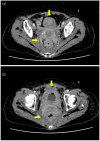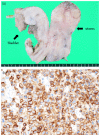Progressive plasmacytoid variant bladder cancer with retroperitoneal dissemination: An autopsy case report
- PMID: 32914061
- PMCID: PMC7469833
- DOI: 10.1002/iju5.12167
Progressive plasmacytoid variant bladder cancer with retroperitoneal dissemination: An autopsy case report
Abstract
Introduction: Plasmacytoid urothelial carcinoma is a rare and aggressive variant of bladder cancer.
Case presentation: A 75-year-old woman presented with plasmacytoid urothelial carcinoma with retroperitoneal dissemination was treated with chemotherapy. After an unsuccessful first-line chemotherapy with gemcitabine and cisplatin, we assessed circulating tumor cells; one such cell was found to be positive for programmed death-ligand 1. The patient received second-line chemotherapy with pembrolizumab. However, the tumor extended to the retroperitoneal organs, and the patient eventually died. Autopsy revealed a widespread diffuse scirrhous infiltration of the carcinoma into the retroperitoneum. However, distant metastasis was not observed.
Conclusion: The evaluation of circulating tumor cells and autopsy revealed a disease state of progressive plasmacytoid urothelial carcinoma treated with pembrolizumab.
Keywords: autopsy; circulating tumor cell; pembrolizumab; plasmacytoid urothelial carcinoma; urinary bladder neoplasm.
© 2020 The Authors. IJU Case Reports published by John Wiley & Sons Australia, Ltd on behalf of the Japanese Urological Association.
Conflict of interest statement
The authors declare no conflict of interest.
Figures




References
-
- Keck B, Stoehr R, Wach S et al The plasmacytoid carcinoma of the bladder–rare variant of aggressive urothelial carcinoma. Int. J. Cancer 2011; 129: 346–54. - PubMed
-
- Fox MD, Xiao L, Zhang M et al Plasmacytoid urothelial carcinoma of the urinary bladder: a clinicopathologic and immunohistochemical analysis of 49 cases. Am. J. Clin. Pathol. 2017; 147: 500–6. - PubMed
-
- Sahin AA, Myhre M, Ro JY, Sneige N, Dekmezian RH, Ayala AG. Plasmacytoid transitional cell carcinoma. Report of a case with initial presentation mimicking multiple myeloma. Acta Cytol. 1991; 35: 277–80. - PubMed
Publication types
LinkOut - more resources
Full Text Sources
Research Materials
